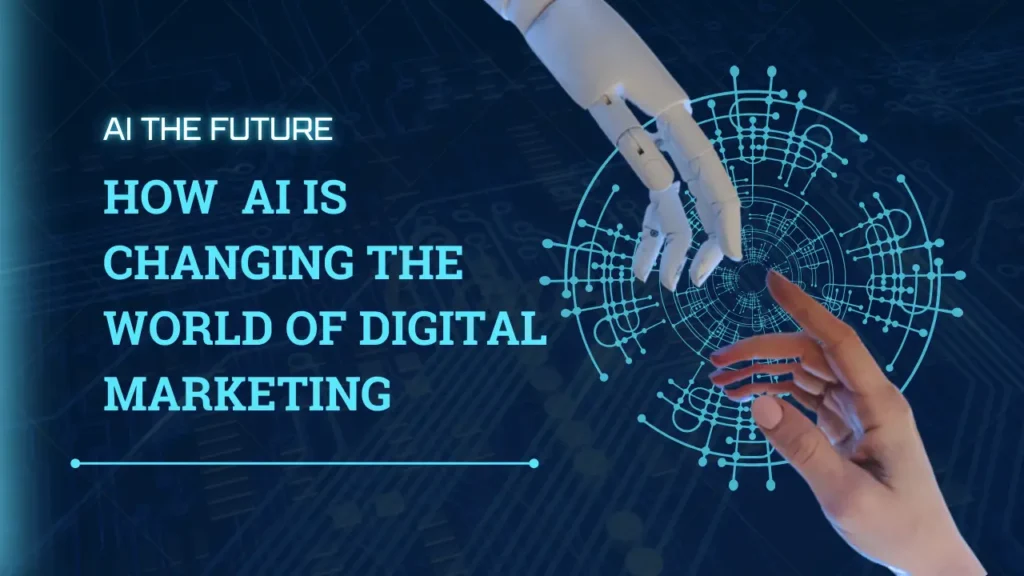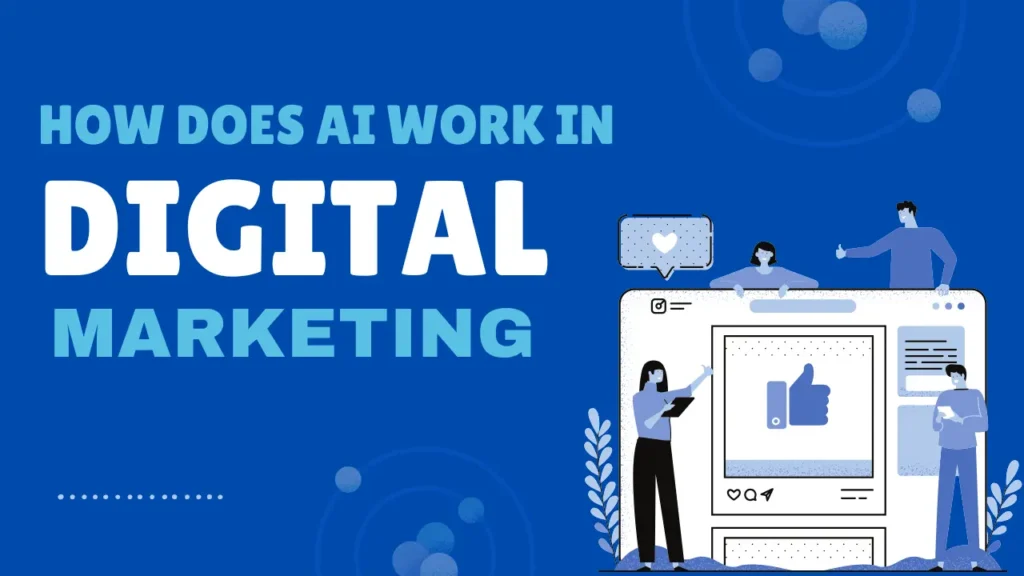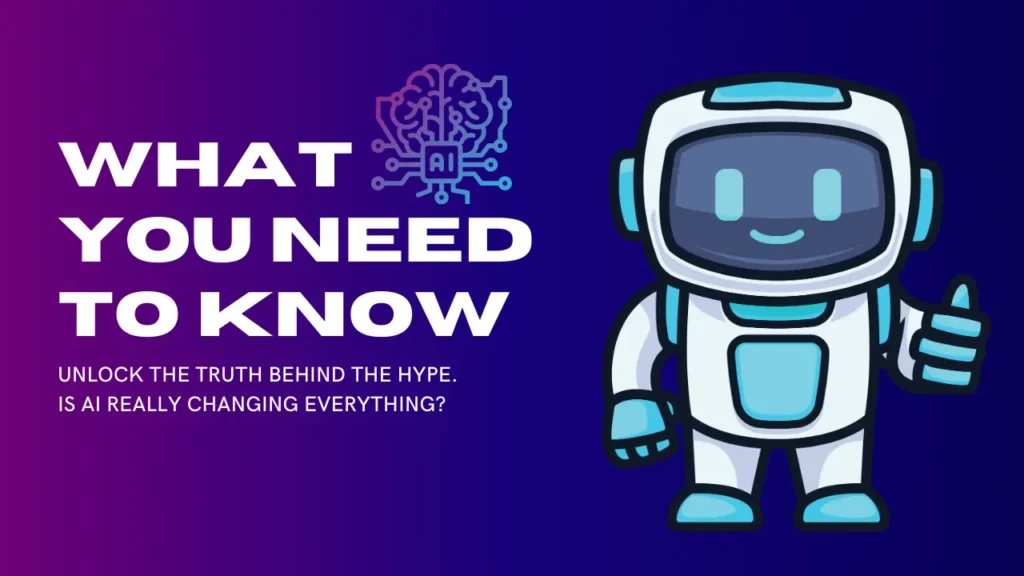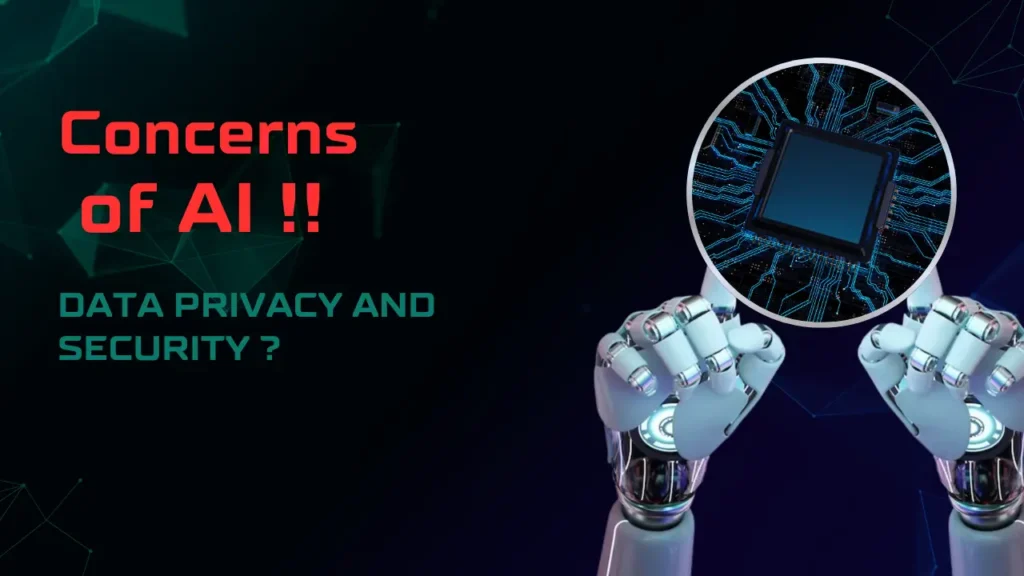
AI in digital marketing is changing the game by making marketing smarter, faster, and more personalized. From automating tasks to analyzing data, AI helps businesses connect with customers in more meaningful ways. It’s being used to create content, predict trends, improve customer service, and target the right audience more accurately. As AI continues to evolve, digital marketing strategies will become even more efficient, allowing brands to deliver better experiences and drive higher results. In this guide, we’ll explore how AI is transforming digital marketing, the tools you can use, and how to make the most of this powerful technology in your marketing efforts.
What is AI in Digital Marketing?
AI in digital marketing refers to the use of artificial intelligence technologies to enhance marketing strategies and improve customer experiences. It allows businesses to automate tasks, analyze vast amounts of data, and deliver personalized content and ads to the right people at the right time.
At its core, AI helps marketers understand customer behavior by processing data like browsing history, purchasing patterns, and social media activity. This allows businesses to create highly personalized campaigns that are tailored to individual preferences, increasing the likelihood of engagement and conversions. For example, AI can recommend products based on past purchases or send targeted emails based on a customer’s browsing behavior.
AI also streamlines many time-consuming marketing tasks. With the help of chatbots, businesses can provide instant customer service, answer questions, and assist in making purchases—all without human intervention. Additionally, AI tools can automate social media posting, content creation, and even ad campaigns, saving marketers time and ensuring consistency across channels.
Another powerful feature of AI is predictive analytics. It helps businesses forecast future trends and customer behavior, enabling them to make data-driven decisions and optimize their marketing strategies. By analyzing patterns in customer data, AI can suggest the best times to launch campaigns or the most effective type of content for specific audiences.
AI Digital Marketing Tools

AI digital marketing tools are designed to automate processes, analyze data, and improve marketing strategies by utilizing artificial intelligence. These tools help marketers create more personalized experiences, optimize campaigns, and save time on repetitive tasks. Here are some key AI-powered tools commonly used in digital marketing:
- Chatbots (e.g., Drift, Intercom)
AI-driven chatbots assist with customer service by answering queries, guiding users through the sales funnel, and providing 24/7 support. They can handle routine tasks, improving efficiency while ensuring a better customer experience. - Email Marketing Automation (e.g., Mailchimp, HubSpot)
AI-powered email marketing tools can help automate campaigns, segment audiences based on behavior, and personalize content for each recipient. These tools can also analyze performance metrics to refine strategies for better engagement. - Content Creation Tools (e.g., Jasper, Copy.ai)
AI-based content creation tools generate copy for blog posts, social media, product descriptions, and emails. They can help marketers produce high-quality content quickly by analyzing trends and audience preferences. - Predictive Analytics Tools (e.g., Salesforce Einstein, Pega)
These AI tools help businesses predict customer behavior and future trends. They analyze past data and behaviors to forecast the success of marketing campaigns, enabling businesses to make data-driven decisions. - SEO Optimization Tools (e.g., Clearscope, Surfer SEO)
AI-powered SEO tools help marketers optimize content for search engines by analyzing top-ranking pages, keyword usage, and search intent. They make it easier to create content that ranks higher on Google and attracts more organic traffic. - Social Media Management Tools (e.g., Hootsuite, Sprout Social)
These tools use AI to schedule posts, track social media performance, and analyze customer engagement across different platforms. They can also help optimize the timing of posts based on audience activity. - Ad Campaign Management (e.g., Google Ads, Facebook Ads Manager)
AI tools in advertising platforms help marketers create, optimize, and automate ad campaigns. They can adjust bids, target specific audience segments, and even generate creative ad variations for better performance.
These AI tools help digital marketers work more efficiently, make informed decisions, and improve customer engagement by personalizing experiences at scale.
How Marketers Are Leveraging AI in Their Digital Campaigns

AI has become an invaluable resource for digital marketers, revolutionizing how they engage with customers, streamline processes, and optimize performance. From crafting content to enhancing customer interactions, AI is being integrated into various marketing tasks to improve efficiency and personalization. Here’s a breakdown of how AI is transforming digital marketing practices:
1. Automated Content and Creative Development
Creating quality content consistently can be a challenge for many marketing teams. AI tools like ChatGPT and Claude have made it easier to generate content quickly. These “generative AI” tools can produce blog posts, email headers, ad copy, social media posts, and more in a fraction of the time it would normally take. AI can even suggest ideas or write content from scratch based on current trends and data.
AI isn’t limited to text; it can also help with generating visuals. AI tools that create images from text prompts are becoming increasingly popular, allowing marketers to produce custom graphics quickly, especially when resources are tight. However, it’s important to review and edit AI-generated content to ensure it aligns with your brand’s voice and style.
2. Enhanced Customer Interactions with Chatbots
AI-powered chatbots are no longer just tools for answering simple customer queries. They’ve evolved into intelligent systems that can assist in more complex tasks like guiding users through product selections, suggesting content, and even recommending purchases based on customer behavior. These smart bots enhance the customer experience by providing personalized, instant support, available 24/7.
Beyond chatbots, AI is now being used to direct customers to the right departments or human agents based on the complexity of the query. This leads to faster resolutions, improving customer satisfaction while saving time for your customer service team.
3. Intelligent Customer Segmentation
Targeting the right audience is essential for the success of marketing campaigns, but doing this manually can be inefficient. AI simplifies segmentation by analyzing vast amounts of data to uncover patterns in customer behavior, demographics, and interests. Whether it’s purchase history, social media activity, or browsing habits, AI can group customers into precise segments.
AI allows marketers to create hyper-targeted campaigns, sending tailored messages or offers to each segment. It can even adjust these segments in real time based on new data, ensuring your marketing always stays relevant and fresh.
4. Optimizing SEO Strategies with AI
SEO is critical for driving organic traffic, but staying on top of search engine updates and optimizing content can be a time-consuming task. AI tools now play a significant role in improving SEO performance by automating tasks like keyword research and content analysis. These tools identify high-performing keywords based on user intent, helping marketers optimize their content for better rankings.
AI is also improving how content is optimized for new search trends, such as voice and image search. By analyzing trends and search patterns, AI can help marketers adjust their strategies, ensuring their content is more discoverable and relevant.
5. Boosting PPC Campaigns with AI
Pay-per-click (PPC) advertising allows marketers to drive targeted traffic quickly, but managing ads and bids efficiently can be a complex task. AI makes it easier by automating bid management, adjusting ad spend in real time, and predicting the best-performing keywords. AI can also optimize ad copy and ad placements based on past campaign data to improve targeting and increase the chances of conversions.
AI-powered tools can also detect fraudulent clicks, protecting your ad budget and ensuring you’re investing in genuine engagement. As AI continues to evolve, it brings even more ways to optimize your PPC campaigns, from adjusting bids based on audience behavior to testing new ad formats.
6. Data-Driven Insights for Smarter Decision-Making
Marketers are inundated with data from various sources, making it hard to draw meaningful conclusions. AI is helping by processing large datasets quickly and providing actionable insights. AI can identify trends, detect outliers, and predict future customer behavior based on historical data.
For example, AI can track interactions across different channels (website, social media, email) to give marketers a complete view of the customer journey. With these insights, marketers can fine-tune their strategies and create more personalized experiences that resonate with customers.
7. Personalizing Email Campaigns with AI
Email marketing remains one of the most effective channels for reaching customers, and AI can help marketers optimize this tool even further. AI can analyze past email performance to determine the best subject lines, optimal sending times, and content for different audience segments.
Additionally, AI enables marketers to create dynamic content that adapts to each user’s preferences. By automating email workflows based on customer actions, such as abandoned cart reminders or personalized product recommendations, marketers can improve engagement and conversion rates. AI tools also help with A/B testing, identifying which elements (e.g., subject lines, call-to-actions) resonate most with your audience.
8. Predictive Analytics for Better Campaign Outcomes
AI helps marketers predict future trends, customer behaviors, and potential market changes, making it an essential tool for forward-looking strategies. By using historical data and AI-powered predictive models, marketers can anticipate customer needs, preferences, and even future product trends. This helps businesses stay ahead of the curve and adjust marketing strategies to match future demands.
Predictive analytics can also help optimize inventory management, product launches, and customer loyalty programs, ensuring a more seamless customer experience.
9. Social Media Insights and Automation
Managing social media campaigns involves a lot of moving parts. AI can help by automating the scheduling of posts, optimizing the timing of content for maximum engagement, and analyzing social media metrics to measure success. AI tools can track social media trends, helping marketers create content that resonates with the audience at the right time.
Furthermore, AI can identify influencers who are most likely to reach your target audience, making influencer marketing more effective. It can also analyze sentiment, giving brands a better understanding of how their content is being received across different platforms.
By incorporating AI into their digital marketing strategies, businesses can optimize their processes, engage their audience more effectively, and stay ahead of industry trends. As AI technology continues to develop, the possibilities for digital marketing will expand even further, making it crucial for marketers to adapt and stay updated on the latest tools and techniques.
Pros and Cons of AI in Digital Marketing

AI has made its mark as a game-changer in the digital marketing space. With its ability to automate tasks, analyze vast amounts of data, and deliver highly personalized customer experiences, AI has become an essential tool for many marketing teams. However, as with any technology, there are both advantages and challenges to integrating AI into marketing strategies. Let’s dive deeper into the pros and cons of AI in digital marketing:
Pros of AI in Digital Marketing
1. Increased Efficiency
AI automates many marketing tasks, such as content creation, data analysis, and customer segmentation. This saves marketers a lot of time, allowing them to focus on more strategic aspects of their campaigns. Tasks that would typically take hours or days can now be completed in minutes, which boosts productivity across the team.
2. Improved Personalization
AI helps marketers create highly personalized experiences for their customers. By analyzing customer data, AI can deliver tailored content, product recommendations, and email offers based on individual preferences. This level of personalization leads to better customer engagement and higher conversion rates, as customers feel that brands understand their needs.
3. Better Targeting and Segmentation
AI uses algorithms to analyze vast amounts of data and segment customers based on behavior, demographics, and purchasing habits. This ensures that marketing messages are delivered to the right people at the right time. As a result, AI helps brands target more precisely and increase the likelihood of a sale or conversion.
4. Data-Driven Insights
AI can process large datasets much faster than humans, offering insights that marketers can use to refine strategies. From identifying customer behavior patterns to predicting future trends, AI helps businesses make informed decisions that are based on data, rather than assumptions.
5. Cost-Effective
By automating tasks and improving efficiency, AI can help brands save money. Marketing teams can accomplish more with fewer resources, and by using AI tools like chatbots or predictive analytics, businesses can reduce the need for large customer service teams or expensive manual processes.
6. Enhanced Customer Experience
AI-powered chatbots and virtual assistants offer 24/7 support, answering queries instantly and guiding customers through purchasing decisions. This improves the overall customer experience by providing quick, personalized responses and assistance, even when human agents aren’t available.
Cons of AI in Digital Marketing

1. Lack of Human Creativity
While AI can generate content and automate processes, it still lacks the creativity and emotional intelligence that human marketers bring to the table. AI tools may create perfectly good content, but they might not fully capture a brand’s unique voice or emotional appeal. Over-reliance on AI can lead to robotic, impersonal communication that feels disconnected from the target audience.
2. Data Privacy Concerns
AI relies on collecting and analyzing large amounts of personal data to deliver personalized experiences. This raises concerns about privacy and data security, especially with growing awareness around data protection laws like GDPR. Customers may feel uncomfortable with the amount of data being collected, potentially damaging trust if not managed responsibly.
3. Complexity and Learning Curve
Integrating AI into marketing strategies often requires specialized knowledge and skills. Marketers may need to undergo training to fully understand how AI works and how to implement it effectively. Additionally, the initial setup and configuration of AI systems can be time-consuming and expensive.
4. Dependence on Data Quality
AI’s effectiveness depends on the quality of the data it’s given. If the data is inaccurate, outdated, or biased, AI-driven insights can lead to poor decision-making. Inaccurate customer data, for example, could result in irrelevant marketing campaigns or misleading customer segmentation.
5. Job Displacement Concerns
As AI automates tasks that were once performed by humans, there’s concern about job displacement. While AI can improve efficiency, it may lead to a reduced need for certain roles, such as data entry or customer service positions. This could create a shift in the workforce, requiring new skill sets and leading to job losses in some areas.
6. Over-Reliance on Technology
AI is a tool that supports decision-making, but it’s not infallible. Over-relying on AI can result in missed opportunities for innovation and human judgment. Sometimes, the best decisions in marketing come from intuition, creativity, and understanding the emotional aspects of customer behavior—things AI can’t fully replicate.
Future of ai in digital marketing

The future of AI in digital marketing is bright and full of potential. As technology continues to evolve, AI will help marketers create even more personalized and efficient experiences for customers. AI will automate tasks like content creation, customer service, and data analysis, allowing marketers to focus on creativity and strategy. It will also enable smarter targeting and better predictions of customer behavior, making campaigns more effective. With advancements in AI, digital marketing will become more interactive and immersive, especially with the growth of voice search, augmented reality, and visual search. Overall, AI will continue to revolutionize digital marketing by making it more precise, faster, and customer-focused.
Conclusion
In conclusion, AI is transforming digital marketing by making it smarter, faster, and more personalized. It helps marketers automate tasks, analyze vast amounts of data, and deliver highly tailored experiences to customers. While there are challenges, such as the need for quality data and the potential for over-reliance on technology, the benefits of AI in improving efficiency, targeting, and customer engagement are undeniable. As AI continues to evolve, digital marketing will only become more powerful, offering new ways to connect with customers and drive business growth. Embracing AI in your marketing strategy is no longer optional; it’s a key to staying competitive in today’s digital world. To know more feel free to visit our privacy policy page.